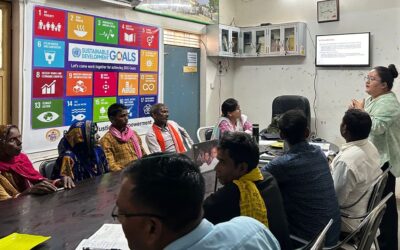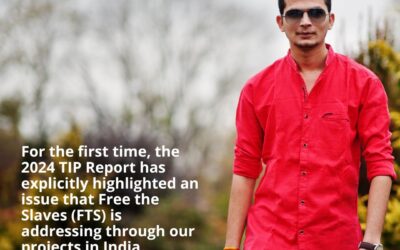Here is a heartwarming update from two 2010 Freedom Award winners!
One of the most moving moments from the 2010 Freedom Awards occurred when Wilberforce Award winner Roger Plant announced from the stage that he was donating his cash prize to another award-winner, JEEVIKA. Founded by Kiran Kamal Prasad, Karnataka, India-based organization JEEVIKA works to eradicate bonded labor.
Read: Bihar, India: Bonded Laborers in Transit are Slaves
Roger’s father, Arthur Plant passed away just a month prior to the awards ceremony. So, Roger said, he was giving the money to remember his father, and to honor JEEVIKA’s work: “I hope [JEEVIKA] can use [the money] for a series of small grants. Let’s call them the Arthur Awards to show how even small sums can change people’s lives. I want to hold just a little amount back to go there in a year’s time to get to know the beneficiaries and see the impact on their lives. And I then hope to build bridges between thsi real work on the ground and the policy world, convincing others to use their money to tackle the causes of slavery, and help those who suffered from it.”
Watch video of Roger Plant’s Freedom Award acceptance speech below. To see the 2010 Freedom Awards in their entirety, go here.
Watch: CNN Covers FTS’ Anti-Slavery Work in India, Raid & Rescue of Child Slaves Caught on Tape
JEEVIKA’s founder Kiran Kamal Prasad honored Roger’s request, and staged the Arthur Awards earlier this year. Kiran wrote about the ceremony on JEEVIKA’s website here. And, he sent Roger a letter detailing the program. Roger and Kiran shared this message with Free the Slaves, and we are sharing it with you now. Read the letter after the jump!
Later on this year, Roger will go to Karnataka, India, to visit with Kiran and the Arthur Award winners. We’ll keep you updated on the developments.
Dear Roger,
On the 1st April we had organised a simple, meanignful and yet very effective programme to give out the Arthur Awards which we have named in Kannada, “AAdhaara Koduge” meaning supportive gifts. Thirteen former leaders and present active members of the union of bonded labourers from nine taluks were scrutinised and selected in a thorough manner and given cheques in their names to enable them to buy some self supporting asset for their livelihood. A majority of them have opted for milching cows, two for bullocks, one each for goats, a petty shop and basket making.
The thirteen persons are: Sriramappa (Hosakote, Bangalore Rural), Gangadhara (Bangarapete, Kolar), Dodda Yeleyappa (Magadi, Ramanagar), HC Choudappa (Bagepally, Chikballapur), N Kadirappa (Gudibande, Chikballapur), M Narayanappa (Gauribidanur, Chikballapur), Ramamurthy (Pavagada, Tumkur), Prakash Hanamantha Bharametri (Bailahongal, Belganv), Mahadeva, Somayya, Ningayya, Somanna and Shivannegowda (HD Kote, Mysore).
The programme was simple since it was an in-house affair held in our own trianing centre at Nagarabhavi. Yet nealry 120 of our activists and union leaders took part. Some from the new districts supported from the Harriet Tubman Freedom Award were also present like from Bidar, Bijapur, Bellary and Chitradurga.
It was meaningful because the awards were distributed in a common programe rather than individually in their villages. The meaningfulness was further enhanced because we managed to get three very important dalit leaders, intellectuals and politicians to inaugurate and give away the awards. They were Sri AR Krishnamurthy, the present chairman of Dr. BR Ambedkar Development Corporation, Dr. Siddalingaiah, a famous and popular dalit or Kannada poet, one of the founders of dalit movement in Karnataka in the mid 70s (DSS – Dalita Sangarsha Samiti), present chairman of Kannada Book Developemnt Authority and one who raised questions in the Karnataka Legislature on bonded labour on behalf of Jeevika when he was an MLC from 1990 to 2002 for two terms and Dr. Manohar Yadav, present Head of the Sociology Department at ISEC (Institute for Social and Economic Change, Bangalore) and who was an active DSS member from his student days and having very close contacts with leaders of dalit movements and dalit intellectuals all over the country.
It was effective in many different ways. First of all, the programme gave us an opportunity to revisit the concerns of Jeevika by all the activiits and the union leaders. Sri Gopal a member of the Jeevika Core Group very touchingly presented the histroy and concerns of Jeevika. The giving away of awards was a new programme in the life of Jeevika. Its significance and its role not only in securing decent livelihoods to bonded labourers but mainly to promote leaders from among them were clearly brought to the notice of everyone present.
Once the programme was over we could feel that the three dignitaries we had invited were the most suitable for the occasion. Sri Krishnamurthy was a recent friend of Jeevika through the contacts of our activists in HD Kote. He had taken part in an earlier programme of Jeevika organised at the end of October 2010 to facilitate Kiran and Shivanna on receiving the Harriet Tubman Freedom Award. At that time itself he had assured us that he would like to propose some specific development programmes for the released bonded labourers. That promise is yet to be implemented but he was still keen on pursuing it. Apart from that, during the present programme he came out with a few more specific assurances that would help not only the released bonded labourers but also Jeevika activists in securing livelihood resources and procuring lands for dalits and bonded labourers.
The speech of Dr. Siddalingaiah was the most energising. He is not only a great poet but also a great orator. His message on the power of the struggle of the poor combined with rationality or awakening captivated everyone. In my presidential speech, I brought out his great contribution to the cause of bonded labour in Karantaka and in the nurturing of Jeevika. After two years of gathering data on bonded labour in one taluk, Dr. Siddalingaiah used the data to question the government in the legislature in June 1990 on its policy on bonded labour. This was in the context of the Karntaka Government officially declaring from 1980 that it had wiped out the system in the state. I certainly feel that it was due to the power of oratory and stature of Dr. Siddalingaih that the minister concerned readily acknoweldged the survival of the evil system and readily gave an assurance to do whatever that was required to be done under the law. This was the first victory in lobbying and advocacy by Jeevika and the administrative machinery started moving in favour of bonded labour. Dr. Siddalingaiah during all the 12 years he was in the Legislature kept the government on tenterhooks by continuously raising questions on bonded labour. His powerful poetry full of evocative imagery continues to inspire dalit and other progressive activsits in all the villages of Karnataka. His presence itslef was inspiring and much more the message he gave us during the programme.
Dr. Manohar Yadav noted that Jeevika is a dalit movement and very effective at that. In my speech I brought out his significance to Jeevika in the immediate future. Jeevika had launched ‘barefoot research’ in 1998 but did not pursue it for lack of funds. Ongoing action research has to be initiated to support its activities. Jeevika also requires to forge closer links with other dalit and other progressive movements. In all this, the support from Dr. Yadav would be very crucial.
Thanks to Roger Plant and the donation of his Wilberforce Freedom Award in the name of his beolved fatehr, Anthony Plant, who passed away in mid 2010, Jeevika was able to launch a new and important porgramme to benefit bonded labourers as also its efforts at eradicating the bonded labour system. We hope the programme will live up to its objective and grow further. There is already an indication that it will grow as all the 13 beneficiaries declared that they would contribute to a common pool from their profits so as to help other needy former bonded labourers who need support. Great gesture.
Thank you Roger and we hope to see you here in Karnataka towards the end of this year.
All the best.
Kiran



